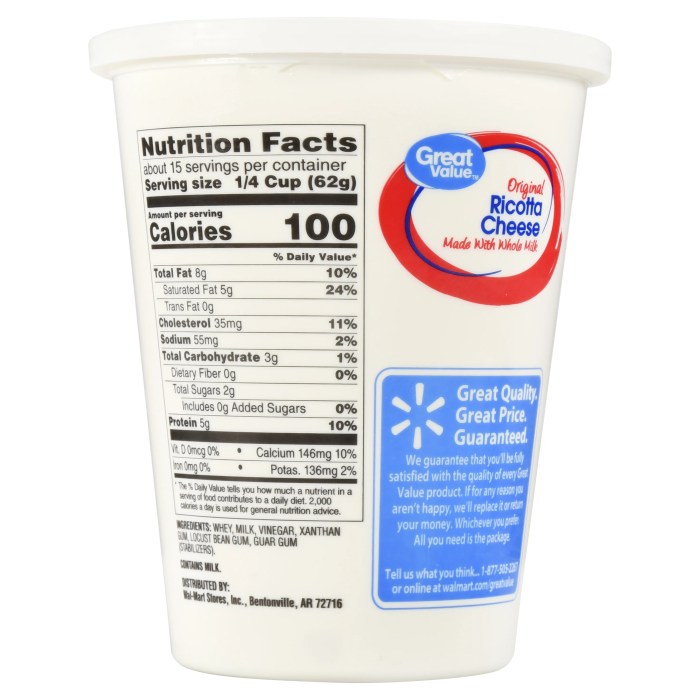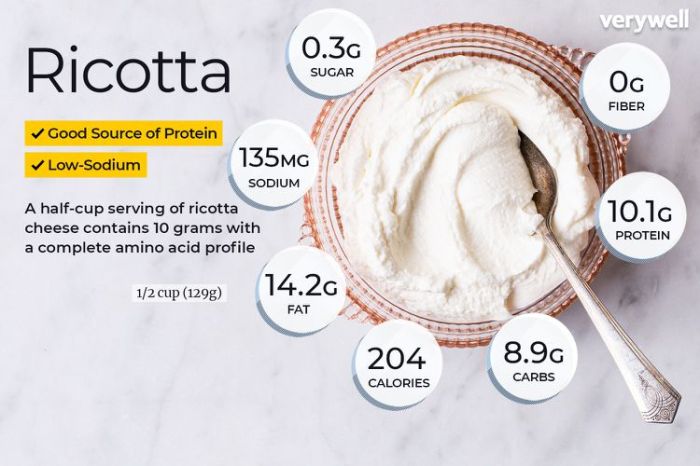Ricotta Cheese Nutritional Profile

Nutrition facts for ricotta cheese – Ricotta, meaning “recooked” in Italian, is a delightful cheese with a creamy texture and subtly sweet flavor. Its versatility makes it a star in both sweet and savory dishes, but understanding its nutritional profile can help you incorporate it into your diet mindfully. Let’s delve into the nutritional richness of this beloved cheese.
Nutritional Breakdown of Whole Milk Ricotta Cheese
The following table provides a typical nutritional breakdown for a 1/2 cup (approximately 113g) serving of whole milk ricotta cheese. Remember that nutritional values can vary slightly depending on the brand and manufacturing process.
Ricotta cheese? Surprisingly nutritious! It’s lower in fat than some cheeses, a good source of protein, and even boasts some calcium. But let’s be honest, sometimes you crave the glorious, cheesy, carb-loaded goodness of mac and cheese nutrition , which, while delicious, might not be quite as virtuous. So, back to ricotta: a guilt-free(ish) way to enjoy creamy deliciousness!
| Nutrient | Amount | % Daily Value (DV)* | Unit |
|---|---|---|---|
| Calories | 170-180 | 8-9% | kcal |
| Total Fat | 10-12g | 15-18% | g |
| Saturated Fat | 6-7g | 30-35% | g |
| Cholesterol | 30-40mg | 10-13% | mg |
| Sodium | 100-150mg | 4-6% | mg |
| Total Carbohydrate | 6-8g | 2-3% | g |
| Dietary Fiber | 0-1g | 0-4% | g |
| Total Sugars | 4-6g | – | g |
| Protein | 13-15g | 26-30% | g |
| Calcium | 200-250mg | 20-25% | mg |
| Iron | 1-2mg | 6-11% | mg |
| *Percent Daily Values are based on a 2,000 calorie diet. Your daily values may be higher or lower depending on your calorie needs. | |||
Comparison of Ricotta Cheese Varieties
Understanding the differences between whole milk, part-skim, and low-fat ricotta is crucial for making informed choices.Choosing the right type of ricotta depends on your dietary needs and preferences. Here’s a comparison:
- Whole Milk Ricotta: Highest in fat and calories, offering a richer, creamier texture and a more intense flavor. It also provides a higher amount of calcium and other fat-soluble vitamins.
- Part-Skim Ricotta: A middle ground, containing less fat and calories than whole milk ricotta but still retaining a reasonably creamy texture and good flavor. It’s a good compromise for those seeking a slightly healthier option.
- Low-Fat Ricotta: Significantly lower in fat and calories, resulting in a less creamy texture and potentially a slightly less rich flavor. While lower in fat, it still provides a good source of protein and calcium.
Impact of Preparation Methods on Nutritional Content
The way you prepare ricotta cheese can subtly affect its nutritional profile.
- Baking: Baking ricotta generally doesn’t significantly alter its nutritional content, though the addition of other ingredients (sugars, fats) in recipes will impact the overall nutritional profile of the dish.
- Frying: Frying ricotta cheese, especially if coated in breading or batter, will dramatically increase its fat and calorie content due to the absorption of oil. This method should be used sparingly.
Macronutrient Composition and Health Implications

Ricotta cheese, a delightful dairy delight, offers a unique macronutrient profile that contributes to both culinary versatility and potential health benefits. Understanding its composition—the interplay of protein, fats, and carbohydrates—is key to appreciating its nutritional value and incorporating it effectively into a balanced diet. Let’s delve into the specifics of each macronutrient and explore their implications for your well-being.
Ricotta’s macronutrient composition makes it a surprisingly versatile food, suitable for various dietary needs and preferences. Its relatively high protein content, moderate fat levels, and lower carbohydrate count offer a balanced approach to nutrition.
Protein Content and its Benefits
Ricotta cheese is a respectable source of protein, providing roughly 12 grams per 100 grams of cheese. Protein is essential for building and repairing tissues, including muscle. The protein in ricotta contributes to satiety, meaning it helps you feel fuller for longer, which can be beneficial for weight management. This feeling of fullness can help curb cravings and prevent overeating, supporting healthy dietary habits.
For example, incorporating ricotta into a breakfast smoothie or enjoying it as part of a high-protein lunch can contribute to sustained energy levels and improved appetite control throughout the day. This makes it a smart choice for athletes aiming to build muscle mass or individuals striving for weight management.
Fat Composition and Health Effects
Ricotta cheese contains both saturated and unsaturated fats. While it’s higher in saturated fat compared to some other cheeses, the overall fat content is moderate. Saturated fats, when consumed in excess, can raise LDL (“bad”) cholesterol levels, potentially increasing the risk of heart disease. However, ricotta’s fat profile also includes unsaturated fats, particularly monounsaturated and polyunsaturated fats, which are considered beneficial for heart health.
These fats can help lower LDL cholesterol and raise HDL (“good”) cholesterol levels. The balance between saturated and unsaturated fats in ricotta depends on the animal’s diet and the cheesemaking process. Choosing low-fat or part-skim ricotta can help reduce saturated fat intake. Moderation is key, as with all dietary fats. A balanced diet that includes ricotta as part of a varied food intake is less likely to cause problems from its fat content.
Carbohydrate Content and Blood Sugar Impact, Nutrition facts for ricotta cheese
Ricotta cheese is relatively low in carbohydrates compared to many other dairy products. The carbohydrates present are primarily lactose, a type of milk sugar. The low carbohydrate content means that ricotta has a minimal impact on blood sugar levels, making it a suitable choice for individuals managing diabetes or those following low-carbohydrate diets. The slow digestion and absorption of lactose in ricotta contributes to a gradual release of glucose into the bloodstream, preventing sharp spikes in blood sugar.
However, individuals with lactose intolerance should consume ricotta in moderation and monitor their symptoms, as lactose can cause digestive discomfort in some people.
Micronutrient Content and Benefits: Nutrition Facts For Ricotta Cheese
Ricotta cheese, beyond its delightful creamy texture and versatility in culinary applications, offers a surprising array of essential micronutrients that contribute significantly to overall health and well-being. These vital nutrients, often overlooked, play crucial roles in various bodily functions, supporting everything from strong bones to a healthy nervous system. Let’s delve into the specific micronutrients found in ricotta and explore their remarkable benefits.
Key Micronutrients in Ricotta Cheese and Their Associated Health Benefits
Ricotta cheese is a surprisingly good source of several key micronutrients. The following table details the significant micronutrients present and their contributions to a healthy lifestyle. Remember that the exact nutrient content can vary depending on factors such as the animal’s diet and the manufacturing process.
| Micronutrient | Amount (per 100g, approximate) | Health Benefits | Contribution to Overall Well-being |
|---|---|---|---|
| Calcium | 200-300mg | Essential for strong bones and teeth, muscle function, nerve transmission, and blood clotting. | Reduces the risk of osteoporosis and supports overall skeletal health. Contributes to healthy muscle contractions and nerve impulses. |
| Vitamin B12 (Cobalamin) | 0.3-0.5 mcg | Crucial for red blood cell formation, nerve function, and DNA synthesis. Plays a vital role in maintaining healthy cognitive function. | Prevents megaloblastic anemia and supports healthy neurological function. Contributes to energy production and overall cognitive health. |
| Riboflavin (Vitamin B2) | 0.2-0.3 mg | Involved in energy metabolism, red blood cell production, and the maintenance of healthy skin and vision. | Contributes to energy levels, supports healthy skin and eyes, and plays a role in cellular function. |
| Phosphorus | 200-250 mg | Essential for bone health, energy production, and cell signaling. | Works synergistically with calcium for strong bones. Supports energy metabolism and various cellular processes. |
Micronutrient Comparison: Ricotta Cheese vs. Other Dairy Products
While ricotta shines in its micronutrient profile, it’s helpful to compare its nutritional value to other popular dairy choices like cottage cheese and yogurt. The exact values will vary depending on the brand and type of dairy product. However, a general comparison reveals some interesting differences. Ricotta generally contains a higher concentration of calcium and phosphorus compared to cottage cheese, but yogurt often boasts a higher concentration of certain B vitamins, particularly Vitamin B12, depending on the fortification.
Cottage cheese, on the other hand, often has a higher protein content. The best choice ultimately depends on individual nutritional needs and preferences. Consulting a nutritionist can help determine which dairy option best suits your dietary goals.
Key Questions Answered
Is ricotta cheese good for weight loss?
Ricotta cheese can be part of a weight-loss diet due to its relatively high protein content, which promotes satiety. However, portion control is key, as it’s still calorie-dense, especially the whole milk variety.
Can I eat ricotta cheese if I’m lactose intolerant?
Lactose intolerance varies in severity. Some individuals can tolerate small amounts of ricotta, while others may experience digestive discomfort. Lactose-free ricotta options are also available.
How long can I store ricotta cheese?
Store ricotta cheese in an airtight container in the refrigerator for up to a week. For longer storage, consider freezing it.
Is ricotta cheese a good source of calcium?
Yes, ricotta cheese is a good source of calcium, important for bone health. The calcium content varies slightly depending on the fat content.


